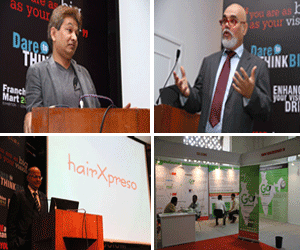Cyrus Mistry, chairman of the $100-billion Tata Group, is set to alter the very discourse on affirmative action in the private sector, by getting into a full-bodied manufacturing joint venture with an obscure company owned by a Dalit entrepreneur. The Tata Group has made an in-principle decision to pick up one-third equity in Delhi-based Chandan & Chandan Industries, a company incorporated to manufacture industrial helmets.
Nand Kishore Chandan, a Dalit entrepreneur, will hold the remaining two-thirds in the company. The investment was personally cleared by Mistry, say sources close to the deal. The Tatas are also exploring the possibility of floating a section 25 (not for profit) company under the Companies Act to channelise more investments into several other Dalit-owned enterprises. Tata group companies could pool monies into this special entity.
Confirming this, an executive from Tata Group’s PR agency said Tata companies are coming together to help Dalit entrepreneurs trying to start businesses. “This is history in the making, and most importantly, a giant step in moving from patronage to partnership,” says Chandra Bhan Prasad, commentator on Dalit issues and mentor, Dalit Indian Chamber of Commerce and Industry (DICCI).
Over the past few years, Cyrus’ predecessor Ratan Tata and former director of Tata Sons, JJ Irani, have infused the conglomerate with a degree of enthusiasm and commitment to the Dalit cause. Apart from investing in Dalit enterprises, the Tata Affirmative Action Programme also works on employment, employability, and education programmes for Scheduled Caste and Scheduled Tribe communities.
DICCI Chairman Milind Kamble said the investments were the culmination of over eight months of negotiations steered by B Muthuraman, vice-chairman, Tata Steel, and chair of the TAAP.
Clearly overawed, Chandan, an electrical engineering diploma holder and a veteran in plastics moulding, could only mumble homilies about being ‘delighted and overwhelmed’ by the prospect of working with the Tata group. The new venture, which is in the process of setting up its factory in Ghaziabad, has already received its first tranche of orders for over 50,000 helmets from a clutch of group companies including Tata Steel, Tata Motors, Tata Housing, and Tata Projects.
It is not yet clear how the investment from the Tatas would come about. Initially it was believed Tata Capital would be in the thick of it, but now, according to DICCI sources, there is talk about creation of a special purpose entity. This move by the Tata Group is indeed a shot in the arm for the concept of ‘supplier diversity’ within the affirmative action space.
Supplier diversity is the trend among large corporations to seek out, handhold, and buy products and services from entrepreneurs belonging to under-privileged and minority sections. It can be voluntary or mandated by the government. In the US, African American, women and other minority-owned companies have benefited a great deal by its proliferation.
The Tatas have added sheen to the concept by not only promising to buy but also investing in such companies. This is in keeping with Ratan Tata’s take on social upliftment. He always underlined “the importance of facilitating integration through affirmative action programmes rather than just giving easy entitlements.” He was among the few industrialists to express solidarity and visit the Mumbai DICCI Expo held in December 2011 along with Adi Godrej of the Godrej group and Farhad Forbes of the Pune-based Forbes Marshall group. A host of senior executives from the Tata group visited and held talks with Dalit entrepreneurs at the Expo.
Cyrus Mistry, on his part, at an in-house Affirmative Action Programme Assessors meet last year maintained ‘the momentum should continue.’ In fact, it was Cyrus who personally conveyed to Milind Kamble his sanction for the project when he happened to bump into the latter at the 25th anniversary celebrations of Sebi in Mumbai recently.
NK Chandan started his career as a shop floor employee in 1990 and by 2001, on the strength of the considerable expertise he had acquired, was inducted as a partner in the plastic moulding company he worked for. The company did well by manufacturing plastic spares for photo copying machines. In 2012 he bought out the partners, acquired the plant spread over 1200 sq metres in Ghaziabad for Rs 1.82 crore, and also renamed the company. “Except for my house, I sold off all my assets and scraped out all my savings to start afresh,” says Chandan. He wanted to get into manufacture of urea bags as the volume demand was high, though margins were low. It then struck him that industrial helmets would be a safer bet.
As DICCI’s Delhi chapter head, he had been mobilising support for Dalit entrepreneurs and this brought him into close proximity with large corporates, including Bombay House. This eventually coalesced into a deal with the Tatas. The helmet manufacturing project is estimated at Rs 3.05 crore, of which Chandan’s contribution is Rs 2.05 crore and the Tatas contribution around Rs 1 crore. The installed capacity is around 3 lakh helmets per annum.
This initiative in supplier diversity comes at a time when things are beginning to look up for Dalit entrepreneurs. Finance Minister P Chidambaram, last Thursday, formally launched the DICCI SME Fund, for investment in companies promoted by SCs. SIDBI has already committed Rs 10 crore to the fund and the finance minister has promised to ask other financial institutions to pitch in. It also comes at a time when the central government is in the process of rolling out a 4 per cent quota in public procurement by government departments and public sector enterprises. While this opportunity is around Rs 46,000 crore, it will be a while before government departments gets it act together.
However, it is the private sector potential that can really trigger change, quickly, as seen by the Tata initiative. Even in the US, it’s the private sector, through the Billion Dollar Club, that is providing heft to the supplier diversity concept. Each of the 18 member companies of the Club buy at least $1 billion worth of products or services from Black American, women, Hispanics and other minorities annually. Members include Ford Motors, IBM, P&G, Walmart, Toyota, Boeing, and Johnson & Johnson































 +91 9909960054
+91 9909960054